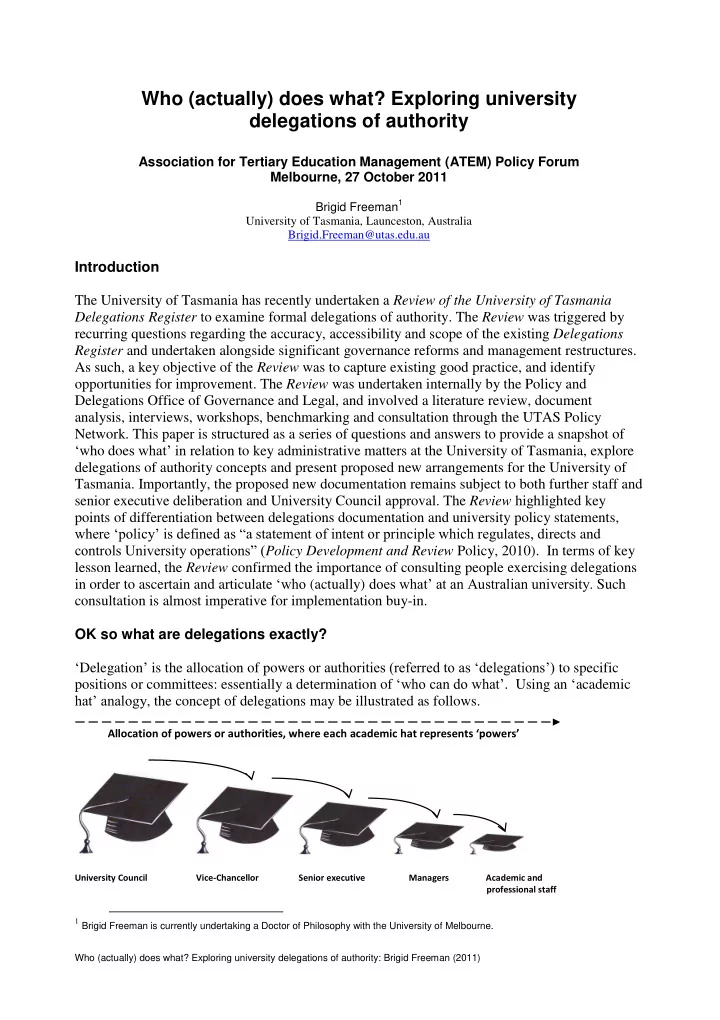

Who (actually) does what? Exploring university delegations of authority Association for Tertiary Education Management (ATEM) Policy Forum Melbourne, 27 October 2011 Brigid Freeman 1 University of Tasmania, Launceston, Australia Brigid.Freeman@utas.edu.au Introduction The University of Tasmania has recently undertaken a Review of the University of Tasmania Delegations Register to examine formal delegations of authority. The Review was triggered by recurring questions regarding the accuracy, accessibility and scope of the existing Delegations Register and undertaken alongside significant governance reforms and management restructures. As such, a key objective of the Review was to capture existing good practice, and identify opportunities for improvement. The Review was undertaken internally by the Policy and Delegations Office of Governance and Legal, and involved a literature review, document analysis, interviews, workshops, benchmarking and consultation through the UTAS Policy Network. This paper is structured as a series of questions and answers to provide a snapshot of „ who doe s what‟ in relation to key administrative matters at the University of Tasmania, explore delegations of authority concepts and present proposed new arrangements for the University of Tasmania. Importantly, the proposed new documentation remains subject to both further staff and senior executive deliberation and University Council approval. The Review highlighted key points of differentiation between delegations documentation and university policy statements, where „policy‟ is defined as “a statement of intent or principle which regulates, directs and controls University operations” ( Policy Development and Review Policy, 2010). In terms of key lesson learned, the Review confirmed the importance of consulting people exercising delegations in order to ascertain and articulate „who (actually) does what‟ at an Australian university. Such consultation is almost imperative for implementation buy-in. OK so what are delegations exactly? „ Delegation ‟ is the allocation of powers or authorities (referred to as „delegations‟) to specific positions or committees: essentially a determination of „who can do what‟ . Using an „ academic hat‟ analogy , the concept of delegations may be illustrated as follows. Allocation of powers or authorities, where each academic hat represents ‘powers’ University Council Vice-Chancellor Senior executive Managers Academic and professional staff 1 Brigid Freeman is currently undertaking a Doctor of Philosophy with the University of Melbourne. Who (actually) does what? Exploring university delegations of authority: Brigid Freeman (2011)
In relation to University of Tasmania delegations, the ultimate source of power is the state government. The state government (through state parliament) transferred powers to the University through the University of Tasmania Act 1992 . The Act allocates powers to the University Council (and Academic Senate). University Council reserves some powers (in accordance with provisions of the Act), and delegates the remainder to the Vice-Chancellor. In turn, the Vice-Chancellor reserves some powers (in accordance with the Act), then - in conjunction with University Council - delegates the remainder to the senior executive, other staff and committees. These delegated powers or authorities are exercised via shared decision-making: authority shared between administrators, academics and the institution‟s governing body (Hines, 2000). This transfer of power is hierarchical (Hammond, 2004) in the sense that University Council appoints the Vice-Chancellor to whom they delegate some of their powers; the Vice- Chancellor in turn is involved in appointing the senior executive to whom powers are then delegated; and in turn senior executive appoint managers and other professional and academic staff to whom powers are delegated. What are delegations documents for? Essentially, delegations are a governance mechanism for formally allocating powers or authorities to staff and committees. Agreed delegations arrangements support clarity and transparency of decision-making (Shattock, 2006). Within the context of Australian universities, delegations documentation articulates „ who can do what‟ in relation to administrative and/or academic powers generally across the institution. For example, who can authorise financial transactions (to what levels); who can authorise human resources decisions (in relation to different categories of professional and academic staff); who can authorise travel (locally, interstate and overseas); who can authorise applications and sign contracts (to what level of commitment); who can authorise risk; who can authorise decisions about teaching, learning and research (such as admissions, credit transfer, assessment, course approvals and intellectual property). Delegations documentation seeks to answer these and related questions. Kaplan (2004) suggests that “while the patterns of delegation and practices of shared governance are neither absolute nor uniform … understanding how governance is defined and implemented … constitutes an essential project for understanding the behaviour of higher education organisations” (p . 166). In this sense an appreciation of delegations of authority as governance instruments can inform and support policy, which effectively articulates university academic and administration intent. What does the current UTAS delegations documentation look like? The current University of Tasmania Delegations Register identifies which positions, university- wide, can exercise delegations for a limited number of administrative matters – including most financial transactions, some contracts matters, a small number of human resources matters, and external representation. The Delegations Register does not identify academic delegations. The Delegations Register contains a lengthy introductory piece providing information regarding delegations principles. The content is drawn from delegations prescribed in governance instruments, that is, the formal governance documentation including the University of Tasmania Act 1992 , University By-laws 1993 , Ordinances and Rules. The content is also derived from non- prescribed delegations determined by key university decision-making authorities. Who (actually) does what? Exploring university delegations of authority: Brigid Freeman (2011)
Recommend
More recommend